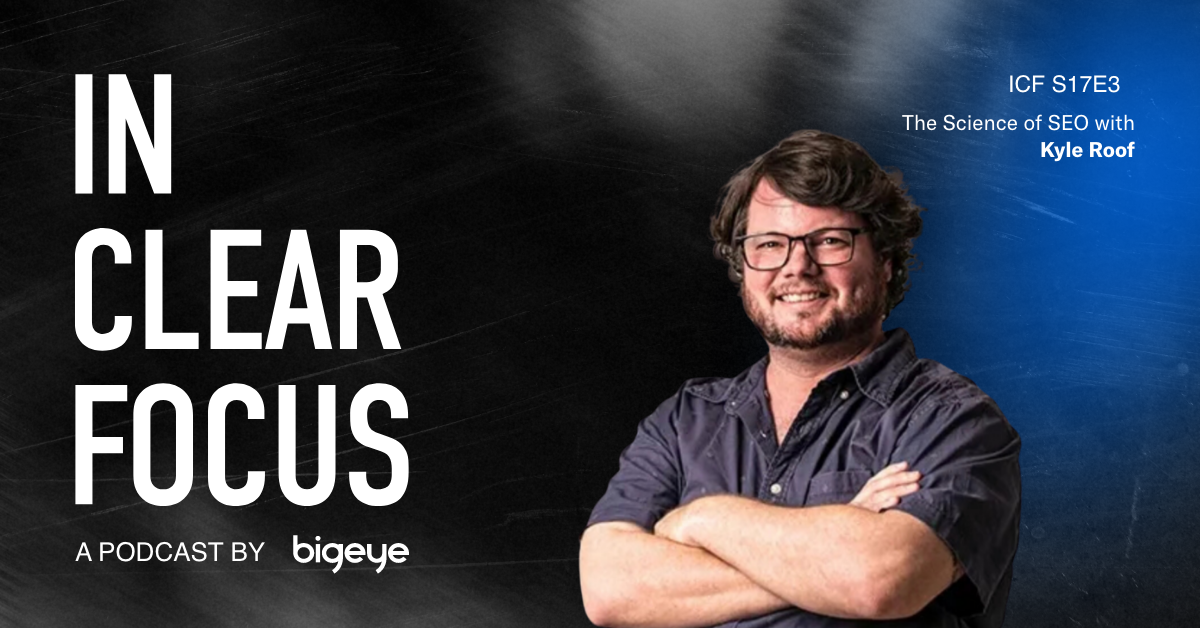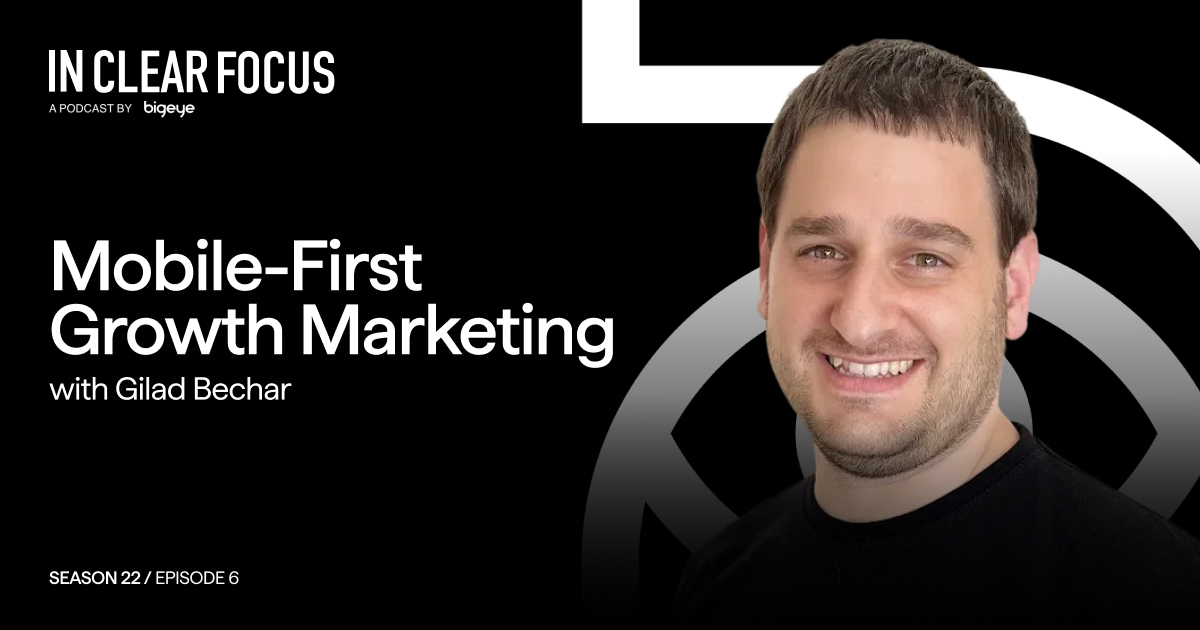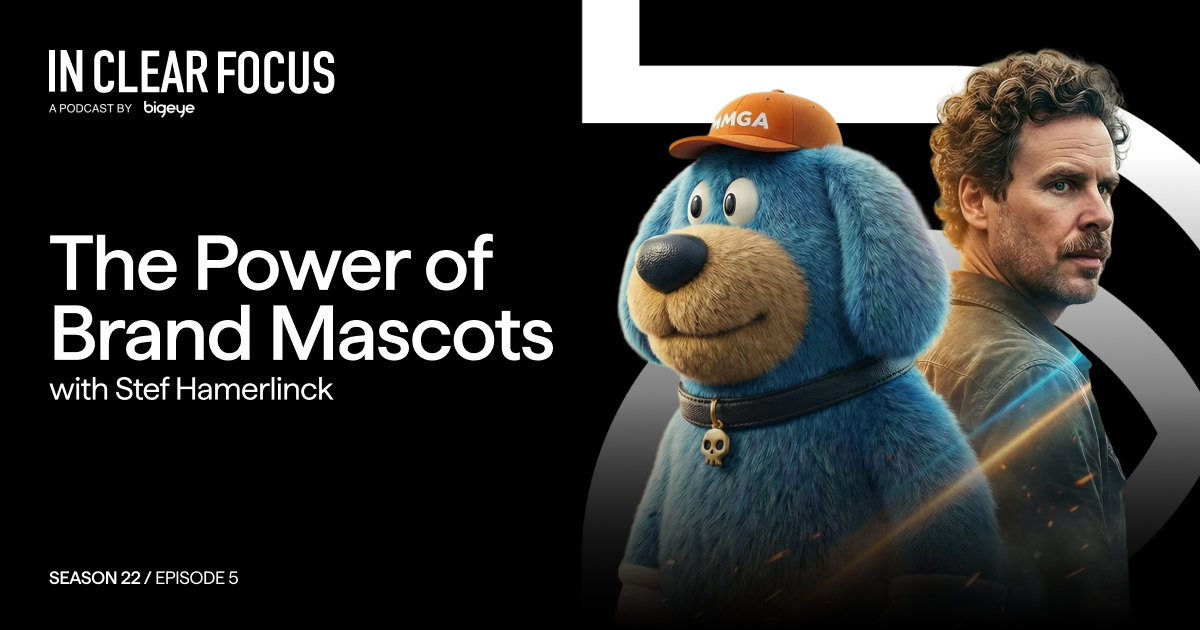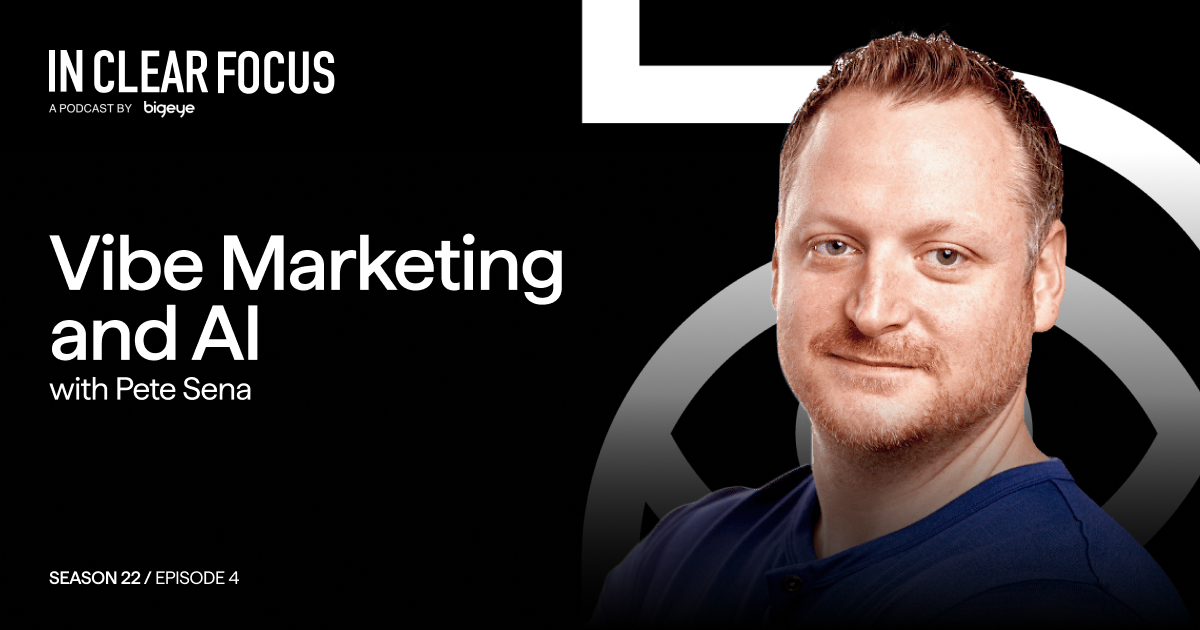IN CLEAR FOCUS: Kyle Roof, noted SEO expert and creator of Page Optimizer Pro, discusses the science of SEO. We hear his journey from attorney to SEO innovator, including his “Lorem Ipsum” experiment. Kyle discusses insights from 400+ tests, emphasizing SEO’s mathematical nature and balancing technical optimization with quality content. We examine his testing methods, findings on grammar and links, e-commerce platforms’ impact on SEO, and AI’s role in the field, plus advice for SEO beginners.
Episode Transcript
Adrian Tennant: Coming up in this episode of IN CLEAR FOCUS
Kyle Roof: The very first thing you need to do is do the search for your term and then look at the pages that Google is ranking, because that’s the type of page that Google is expecting. And that’s the type of page you need to give Google.
Adrian Tennant: You’re listening to IN CLEAR FOCUS, fresh perspectives on marketing and advertising produced weekly by Bigeye, a strategy-led full-service creative agency growing brands for clients globally. Hello, I’m your host, Adrian Tennant, Chief Strategy Officer. Thank you for joining us. Search Engine Optimization, or SEO, is a key component of much online marketing. As brands aim to increase their visibility in order to reach their target audiences online, understanding the intricacies of SEO has become more important than ever. However, with constant algorithm updates and evolving best practices, navigating the world of SEO can be challenging. Our guest today is an expert who has made significant contributions to the field of SEO through his innovative approach and scientific testing methods. Kyle Roof is well known for revealing the secret hidden in plain sight, that Google’s algorithm is all about mathematics. Kyle demonstrated this by ranking number one in Google with a page consisting of gibberish text and only a handful of target keywords. Kyle has since conducted over 400 scientific SEO tests, which form the basis of his popular tool, Page Optimizer Pro. He’s also the co-founder of agency, High Voltage SEO, and online course provider, Internet Marketing Gold. In 2020, Kyle was awarded a US patent for his SEO testing method. To discuss the science of SEO, I’m delighted that Kyle is joining us today from Chiang Mai, Thailand. Kyle, welcome to IN CLEAR FOCUS.
Kyle Roof: Thanks for having me. Happy to be here.
Adrian Tennant: So Kyle, can you tell us a bit about your journey into SEO?
Kyle Roof: In a previous life, I was an attorney. I was a trial attorney and I did divorce custody and support and criminal offense. And I was in court every day and I did that for four years and got pretty burnt out. And I decided to take a year off and I did what most people do – I moved to South Korea for that year to teach English to kindergartners. That one year turned into five and I started a business while I was there and that business needed a website. It’s pretty complex. I actually ended up having to kind of go through a lot of developers and I got a good crew of developers. Then I decided a fun side project would be to general contract websites. Lots of ups and downs from there, but then I moved into the marketing part of it and it turned out I was significantly better at SEO than I was at building websites. I was fortunately able to meet my business partner and now we’re here. It’s kind of the very abridged version of that part of my life.
Adrian Tennant: Well, as I mentioned in the intro, you caused quite a stir with your Lorem Ipsum experiment, where you ranked a nonsensical text page for a competitive keyword. Can you walk us through this experiment and what it revealed about Google’s algorithm?
Kyle Roof: Yeah, that, that definitely put me on the SEO map, and I think it’ll live with me till I die. It was a competition. It was a public competition in 2018, actually, to rank for the term “rhinoplasty Plano.” Rhinoplasty is a nose job, and Plano is right outside of Dallas, Texas. And I felt pretty good at SEO and I had a strong team with me at High Voltage. And so we kind of threw our hat in the ring, and 27 professionals went after this. It was a 30-day competition. So it was a real sprint and you had to use a fresh domain. So a domain that you hadn’t done anything to at all. And then after that, you can do whatever you want. There were no other rules. And so we got in and we did our thing. And at the end of the 30 days, we actually took fifth. Only seven people actually got a page to rank, which I thought was pretty interesting out of the 27 people that entered, the pros that entered. Nobody lit the world on fire. The guy that won was on page eight. We were on page nine, which is the very bottom of, of Google. But about two weeks later, we went to page one. We were number seven. About two weeks after that, we went to number one. About two weeks after that, we were number one in organic and in the maps. And about a week and then some change later, we actually wiped out the maps and we were the knowledge panel. A little thing was like we were rhinoplasty plano. And people really started to lose their minds at that point. And the reason they lost their minds is because we did the entire site in lorem ipsum, fake gibberish text. But we did the math. We did the math on how many times we needed the target word, its variations, contextual terms. And then once we had that math, we very crassly copied and pasted it into the lorem ipsum. And in very specific areas as well, because Google looks at different places on the page. And then from that, we were able to take it to number one. About three months after somebody wrote an article about it in one of the online journals, and then Google de-indexed it six hours later, which I think is fair play. But then that night from about 1.15 AM to about 1.27 AM in the morning, Google de-indexed 20 of my test sites. And they had nothing to do with the competition site. It was a punitive action that Google specifically targeted the test sites that I was using, which at first I was, it was not fun. It was, it was disconcerting to say the least. But what I realized is that they completely validated everything I was talking about. If I had gotten lucky, you know, or talking nonsense, I think they would have rolled their eyes and moved on. But I demonstrated how the algorithm works and that the algorithm is an algorithm. And you need to give it the math that it wants. And if you can give the algorithm the math, you can be very, very successful. In the other words, don’t really matter too much. The, the funny kind of next part of that story is that about two years later, I did a course on White Hat SEO. Believe it or not, I’m a White Hat SEO, which means if those aren’t familiar, I stay within the rules. When I, when I do my SEO, I don’t go outside the guidelines. But I needed to reacquaint myself with the guidelines as I was building this course. And on the no-no list in one section where it’s on the automatically generated content, it said that you can’t have pages that make no sense to the reader, but contain keywords. And I was like, well, when did that become a rule? And so I took the URL and put it in the Wayback Machine. And there were two pictures taken of it. One was before the competition and the rule didn’t exist. And then a week after the competition ended, when my site went live and everybody could see it, then they created that rule. So I think I might be the only person on the planet that has both a patent in SEO and an SEO rule that’s been written for them.
Adrian Tennant: Given that Google created that new rule specifically in response to your experiment, what does that reveal about how Google reacts to SEO tactics?
Kyle Roof: Well, it reveals that you can learn about the algorithm this way. And while on the one hand, they always say like, you should learn SEO and you should try it, but you just shouldn’t learn it too well. You know, they want, they want you to get to average, but they don’t want you to actually figure out if something is more important than something else, or if you should be doing this or that they’d like it more. I think in the guesswork game than an actual, Hey, we figured something out kind of game.
Adrian Tennant: Got it. Kyle, you’ve conducted over 400 scientific tests on Google’s algorithm. What’s your process for designing and conducting these tests, and how do you ensure their validity?
Kyle Roof: The biggest thing is you want to reduce as many variables as you can, and that’s in any kind of scientific test that you run. One day when I was searching, I got a page where Google said, we don’t have anything that matches what you asked. And it dawned on me that then that means there’s a place where the sidewalk ends within Google. And that if I create pages for that, then I’m the only one there. And then if I create pages in there, I can tinker with those pages and I can see if something is a positive factor or a negative factor or a non factor, because I’m the only one doing something in that environment. And so I’ll create identical pages going after terms that don’t have any results. And then from there, once I’ve got those pages indexed, I’ll do something to the middle page. And then if it goes up, I can see that’s a positive factor. If the page drops, that’s a negative factor. And if it doesn’t move, then it’s a nothing, it’s a non-factor. But as I started to test, you know, you want to repeat your tests to make sure that they’re valid. And running tests is a very time-consuming and resource-consuming process. And then it dawned on me I could do tests in the inverse. So if I do it one way to see if something’s a positive factor and I watch the page go up, I can do something to all the other pages and then watch the test page drop. And by testing in the inverse, it allows me to definitively say, yes, this is a factor. This is something that impacts out the algorithm because I was able to demonstrate it both ways as in it rising and then also falling.
Adrian Tennant: And just to clarify, “rising” and “falling,” – we’re talking about the placement on the search engine results page, correct?
Kyle Roof: That’s correct. So rising would be moving up in the rankings, falling, dropping in the rankings. And so by figuring out how to test in the inverse really allowed me to accelerate the amount of tests that I was doing and get into a lot of the validation. The biggest thing that you can do with these tests, though, is figure out, is this a ranking factor? Does Google consider this? Uh, we can also see if something is stronger than something else. If I do this, is it more impactful than that? And then we can also see indexing zones. Indexing is where Google comes in and just acknowledges that this page exists and then understands where to put it into the search results. Google says, okay, I understand what this page is about and it fits in over here. So it should rank against these pages. That’s indexing. And they’re slightly different than all the ranking zones where Google looks for ranking factors. And so we can identify a lot of indexing zones as well.
Adrian Tennant: Can you share some of the most surprising or counterintuitive findings from your 400-plus SEO tests?
Kyle Roof: Initially, a lot of the tests that I was running were just kind of so-and-so who’s a guru said this. So let’s go see. And things are interesting. I started running tests in 2015 and people were saying things like reading level or important grammar was important. Spelling was important. Those kinds of things. And it turns out none of them are important. None of them are factors whatsoever. Google is not going to penalize you because English isn’t your first language. It’s more about, are you conveying the message, not are you getting Uh, all your grammar, correct. A more recent one is something if you’re familiar with backlinks, backlinks are votes. And the more votes you get for your content, the more Google likes you is a very simple way to, to think about it. Not all votes are equal. If you get a, a backlink from a very strong side of very authoritative sites, a site that everybody knows, let’s say you’ve got a site from ESPN.com. It’d be better than a site from a link from joesports.com. And in the sense of the ESPN is so large and so many people go. When you do links, there’s a thing called a no follow. It’s where you put a tag on that link and says, I’m not responsible for where you go. And people have traditionally thought that a no follow means that Google will not give you any credit. And this has been a long standing concept within SEO that if you get a no follow link, it’s worthless. Even if you got it on ESPN.com, if it’s no follow, it’s not going to do anything for you. And I showed conclusively that actually no follow links do pass authority. They do work under certain conditions. And that was a huge finding and had a lot of fun publishing that and working through and kind of breaking the hearts of a lot of SEOs that had said otherwise.
Adrian Tennant: Your work suggests that SEO is more about math than good content. So how do you balance this mathematical approach with the need for quality user-focused content?
Kyle Roof: What I’ve found is that if you write good content, it gets pretty close to the math. Bad content does not. If you’re actually writing on the topic that you’re supposed to be writing on and you’re answering the questions that people want answered, you almost naturally do a lot of good SEO and SEO becomes tweaking the pages that need like a lot of work, missed it entirely. They didn’t write about the topic. And you know, you think about when you’re writing papers in high school and then in university, some people are terrible writers. They think they’re good. They think they’re doing it right, but they just simply aren’t. And I think that’s the problem, is that it’s not that SEO and good writing are mutually exclusive, it’s that a lot of people just can’t write to save their lives. And so when they write and it doesn’t also then work for SEO, it’s probably because they’re a bad writer, is what I’ve found. So if you’re on target, usually to get the math right is tweaking. More so than actually writing, we have to write SEO content. Now, if you go from the other perspective, if you try to write from an SEO perspective, you will often write not interesting stuff. You know, it will be hard to read, but if you write from the perspective of the user, the person that you want to read this and you are a good writer, you’re just gonna have to tweak for SEO.
Adrian Tennant: Great advice. Well, let’s talk about Page Optimizer Pro. How does this tool incorporate the insights from your testing?
Kyle Roof: So, you know, in those tests, finding out, is this a factor or not? So the things that the pop looks at are factors. We know that they consistently move the needle. Understanding what factor is more important than another factor and kind of putting those things in that’s within there as well, which is a huge part of the tool. So kind of focusing in on what you need to focus on and then where you need to put stuff is critical. You can do all this by hand. You know, the secret is hiding in plain sight. Google shows you the sites that it likes. You can go through and you can actually by hand count. all of the things that are there. And that’s actually what we initially did way back in the day. And then we realized this is not scalable. You know, like we figured out the math by hand by actually physically going in and counting words and then kind of putting it all together. But we realized that works for one, one go. And then after that, you really don’t want to do it again. And so having a way to count and then process all of that is where pop came from. And so the tests that we have done. Fit in that way. And that, you know, should we even care about this thing? Like, should we care about this tag or that tag? Should we put words here or there? All those tests are kind of what is then built into pop automatically.
Adrian Tennant: “POP” is Page Optimizer Pro – that’s your short version?
Kyle Roof: Yes. Sorry.
Adrian Tennant: Is it offered online as a subscription? Is it software that one downloads?
Kyle Roof: It’s a SaaS. So it’s software as a service and you log in to use it. And the, and the basic premise is you put in your page that you want to rank for a particular term, a keyword that somebody would type into Google. And then we look at your competitors that are doing it well for that particular keyword. And then we give you instructions as to say, if you get your terms in these ranges, in these places, it gives you the best chance to beat your competitors. It gives you the best chance to be successful. And that’s kind of the main concept of the tool.
Adrian Tennant: Let’s take a short break. We’ll be right back after this message.
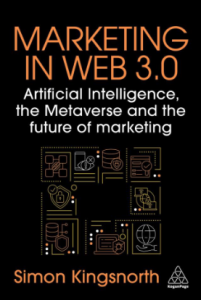 | Adrian Tennant: In partnership with our friends at Kogan Page, this month’s Bigeye Book Club selection is “Marketing in Web 3.0: Artificial Intelligence, the Metaverse, and the Future of Marketing.” The book’s author, Simon Kingsnorth, is a recognized industry expert with over 25 years of marketing experience. Exploring how AI, blockchain, and the Metaverse are reshaping how brands can connect with consumers, Simon’s book is packed with real-world examples, case studies, and actionable advice to help you capitalize on these technologies. As an IN CLEAR FOCUS listener, you can save 25 percent on Marketing in Web 3.0 when you order directly from the publisher at KoganPage.com. Just enter the exclusive promo code BIGEYE25 at checkout. Shipping is always complimentary for customers in the US and the UK. Let Marketing in Web 3.0 be your guide to navigating the future of marketing. |
Adrian Tennant: Welcome back. I’m talking with Kyle Roof, the co-founder of High Voltage SEO and Internet Marketing Gold, and the inventor of Page Optimizer Pro. We’re discussing Kyle’s scientific approach to search engine optimization. Kyle, can you explain contextual terms in SEO and why they’re important?
Kyle Roof: I can! So contextual terms are the terms that give meaning. They give context to what you are talking about in the industry. People, they’re often called LSI terms and old-school SEOs hate that term because it is inaccurate, but it’s kind of the term that the industry has adopted. So I feel like maybe they need to get over themselves, but essentially let’s say I’m talking about a kitchen. If I’m talking about an actual physical kitchen, I might use words like, you know, sink, stove, refrigerator. But what if I’m talking about like a kitchen remodel? Then I might talk about pastel colors or French country style or marble, the concrete, that kind of a thing. But what if I’m talking about that the kitchen is the heart of the home? And then I might use terms about love and celebration and family and those kinds of things. And so while in each of those examples, I’m talking about a kitchen, the contextual terms, the LSI, tell the reader what we’re actually talking about in relation to kitchens. And Google needs those as well. Google needs to know what this page is about. They need to know that you’re actually writing in a good way so that people, other people, like humans know what the page is about. And it’s also something that’s going to give them the information they need because you’re hitting all of the points. And that’s where LSI comes in or contextual terms.
Adrian Tennant: And what does LSI stand for?
Kyle Roof: Latent semantic indexing. And that’s why it’s not the best term because it refers more towards indexing something within a system than ranking something within a system.
Adrian Tennant: As an agency, we work with a lot of consumer packaged goods brands. What SEO considerations should brand marketers consider when working on CPGs?
Kyle Roof: I’ll give you the biggest thing. You need to give Google the page that it’s expecting. So often when working with, say, a product, somebody comes to me and is like, hey, I’m trying to optimize this page, but whatever I do, it won’t rank. And then I’ll look at the page, and they might be doing like a single product page. When I search for the term, Google’s ranking long form articles and so your single product page will never compete with a long form article or vice versa. You know you’re trying to do some long form article or some listicle type page and Google just wants a category. And so the very first thing you need to do is do the search for your term and then look at the pages that Google is ranking because that’s the type of page that Google is expecting and that’s the type of page you need to give Google. And I would say that’s where the vast majority of people go wrong. They just start to optimize some page on their site and not taking into consideration what type of page they should offer to Google for that particular term. And if you did that, that’s going to solve the vast majority of your problems for sure.
Adrian Tennant: Relatedly, there’s been a trend of CPG brands going direct-to-consumer, often using platforms like Shopify. Kyle, what are the SEO implications of using e-commerce platforms?
Kyle Roof: It’s important to note that Google and all search engines are platform- or CMS-agnostic. Using one does not give you an edge over another, nor does one give you a disadvantage. All of them can rank. But if you’re using something like Shopify, it is important to understand that you’re using a closed CMS. Meaning if you want to tweak something, you’re not going to be able to do that. So if you wanted to say, change your URLs structure, uh, you’re not going to be able to do beyond what they allow you to do. If they have a feature you want and they don’t have it, you won’t be able to add to the code in order to do it. And another thing might be in the navigation. I could see some problems there where their navigation might be set that as you create a page, it’s just going to go into the navigation in a certain way. And you may not be able to control that. Those are for, I think, the vast majority of people, just annoyances and not anything that would stop a page from ranking or even stop anybody from using a particular platform. Probably the most effective platform is the one where you can quickly create pages and you like the way it looks. It’s probably the most important thing. After that, most of them, modern CMSs are pretty good with how they have their site structured so that you can still rank well. So long as you’re getting, again, the terms on the page the right amount of times, they won’t do that for you. And even if they create some text for you, it’s probably not going to be overly optimized or terribly effective. But you can put content on those pages that can rank, and you can do very well with them.
Adrian Tennant: You talked there about CMSs that can now generate text for you. How has the rise of artificial intelligence and machine learning impacted SEO, both in terms of Google’s algorithms and the tools available to professionals optimizing for search?
Kyle Roof: AI can’t do SEO. AI doesn’t know Google’s algorithm. It doesn’t care to know it because that’s not what it’s supposed to do by any stretch. But it can help you do things faster. It can help you do tasks faster. And the line that I’ve been using recently though is if you’re bad at SEO, it’s going to help you do bad SEO faster. It’s not going to, you know, it’s not going to instantly make you an SEO expert. And so. The impact, at least from like the exercise or the, or somebody that’s doing SEO side. Hasn’t been all that much in terms of, you still need to understand what you’re doing. AI is not going to do it for you. Uh, but it can help you generate content quickly. It can help you generate ideas quickly. It can help you work on like the structure of your site and maybe what your plan for the site is. Those kinds of things are extremely useful and something that people should be taking advantage of. But in terms of has it like killed SEO or. Are we worried about it? Not really. You know, it’s just, um, in my entire career, SEO has been. Dead every six months because of something. And this is just the latest one, but it turns out it hasn’t died and it won’t die anytime soon. As long as there’s an algorithm, there will be something to optimize. You know, there will be a way to feed that algorithm what it wants. And so AI hasn’t changed that really at all.
Adrian Tennant: Hmm. Well, you offer SEO courses through your platform, Internet Marketing Gold or IMG. What led you to develop the platform?
Kyle Roof: In the same way that Page Optimizer Pro happened, you know, it was through the agency where we had something and then we realized it could stand on its own. When like with Pop, when I was developing it, I showed it to some friends. I was like, would you like this? Is this anything? And they’re like, oh my God, yes. Same kind of thing with IMG where I was teaching SEO to our junior SEOs and I was teaching SEO to other people. And I realized I could just on an economies of scale, create a course and then did an on-page SEO course that’s been wildly successful. And then kind of off of the back of that, we were able to build out the whole learning platform. And now I think we have like 55 instructors, I think, in there covering all different aspects of SEO. And that’s kind of from beginner to advanced, but then also different methods or techniques. Like maybe you want to do e-commerce for example, or you want to do lead gen, or you want to do local SEO, that kind of stuff. There are courses specifically for those things, but there are also courses specifically for techniques or strategies. Like you’re in this situation and you want to do this type of thing. We have courses for that.
Adrian Tennant: Do you offer this as an annual subscription, or is it a per-course fee?
Kyle Roof: It’s an annual subscription. And if people can hold off until Black Friday or pre-market, I think we’re doing a lifetime deal this year.
Adrian Tennant: Excellent. For marketers who are just starting to take SEO seriously, what are the first steps you’d recommend they take?
Kyle Roof: I think there’s a huge difference between knowing SEO and doing SEO. And so I think you have to do it. I would put up a site that, you know, is interesting to you. The topic is interesting, but it’s not associated with anything else you care about. And then when you hear about a technique, try it. Go and do it on that site. See if it actually works. Don’t rely on somebody else telling you that it works. It’s best if you figure that out. Or at least then have a framework to know, like if somebody says, This is effective. You’ve already done a bunch of things. So, you know, like, yeah, that probably is because of the experience that you have. And so it doesn’t take much to put up a website. It’s actually a good exercise to do it, to see how that whole process works, even if you’re not the one that’s ever going to do it. For the company you work for, but yeah, then go and just do some SEO. You’re going to learn so much more than just taking a course and not doing anything and then trying to give your thoughts towards an SEO project, do some SEO. And I think, uh, You’re going to be way ahead of most people that are doing SEO because they’re not really doing it.
Adrian Tennant: Many SEO professionals don’t conduct systematic tests. Why do you think this is?
Kyle Roof: Oh, because they suck. It takes so much. It takes so much time and energy and resources. And, you know, you’ll get halfway through an experiment you’ve been working on for a month and then you realize you messed something up back at the beginning. And it’s all, all kind of invalid or the pages just de-index on you halfway through and You realize you’re not going to get enough data. I think it’s just, it’s, they’re hard to do. One other aspect is they are a little bit hard to think about because you do want to try to get it down to one thing. And most people want to do like a technique and a technique might involve 50 moving parts. And then they’re like, I want to see if this technique works, which is totally fine. Go ahead and do that. That’s more of a case study though. You know, and that, that’s a good thing to do. Case studies are great to do and they’re valid and they give a lot of good information. But if you really want to say like, is this a thing? then you really have to figure out how to isolate that thing and then how you can put it into a webpage or into a search result environment and then start to play with it. And I think sometimes it takes a little bit for people to kind of wrap their minds around that conceptually. And I don’t think it’s as sexy as they thought it was. And so like once they start, I think the fun aspect kind of went away a little bit and they realize it’s a grind. And then after that, I think their interest is completely gone.
Adrian Tennant: How can the industry benefit from more scientific approaches?
Kyle Roof: I mean, there are so many people that just throw out ideas with nothing behind them, other than they heard Google say this once maybe, and they heard somebody else agree with them over here, and that’s it. And it turns into this echo chamber of unhelpfulness. And I think that’s just an overall disservice. But the amount of people doing that is just unstoppable. The industry would do better if there were more people doing tests that also they showed their results, which is what I do. Anytime anybody disagrees with what I’m saying, I’m happy for the disagreement because we all can learn that way. But I’m always like, this is the test that I ran. What do you have? And every time it’s, they’ve just got a feeling, you know, and it’s like, well, that’s fine. Or they’ve got some anecdotal evidence of, I ran a website and I did this one thing one time. That’s also fine. But that’s not anything that can really, I think, benefit a lot of people. So if more people were doing this, I think some of the nonsense in the industry would go away.
Adrian Tennant: Kyle, if our listeners would like to learn more about your work at High Voltage SEO, Page Optimizer Pro or Internet Marketing Gold, what’s the best way for them to do so?
Kyle Roof: We’ve got a lot of good stuff on PageOptimizer.pro. We actually have a whole course there. It’s academy.pageoptimizer.pro. It’s free. And it actually teaches a lot of the basics of SEO. Like even if you’re feeling, you know what, this might be a good refresher and there’s no obligation to it whatsoever. I think that’s a great place to go. We also have like success stories, people, how they applied pop. And I think that might help people see things that they can do. I would go there. Start there. We also have a live chat. And if people have SEO questions, you can send it to the, through the chat and say, “Hey, this is a question for Kyle.” I get those. I answer them in about a day or so. And I’m happy to answer any questions that anybody has.
Adrian Tennant: Excellent. Kyle, thank you very much for being our guest this week on IN CLEAR FOCUS.
Kyle Roof: Thanks so much.
Adrian Tennant: Thanks again to my guest this week, Kyle Roof, co-founder of High Voltage SEO and IMG and the inventor of Page Optimizer Pro. As always, you’ll find a complete transcript of our conversation with timestamps and links to the resources we discussed on the IN CLEAR FOCUS page at bigeyeagency.com. Just select Insights from the menu. Thank you for listening to IN CLEAR FOCUS, produced by Bigeye. I’ve been your host, Adrian Tennant. Until next week, goodbye.
TIMESTAMPS
00:00: Introduction to SEO
02:00: Kyle Roof’s Journey into SEO
03:40: The Lorem Ipsum Experiment
06:50: Google’s Reaction to SEO Tactics
07:30: Designing and Conducting SEO Tests
09:50: Surprising Findings from SEO Tests
11:40: Balancing Math and Quality Content
13:00: Overview of Page Optimizer Pro
14:50: Contextual Terms in SEO
17:55: SEO Considerations for CPG Brands
19:08: SEO Implications of E-commerce Platforms
20:35: Impact of AI and Machine Learning on SEO
22:09: Development of Internet Marketing Gold
23:43: First Steps for SEO Beginners
24:49: Challenges in Conducting Systematic Tests
26:05: Benefits of a Scientific Approach in SEO
27:00: Resources for Learning More About SEO
27:56: Conclusion and Thanks
